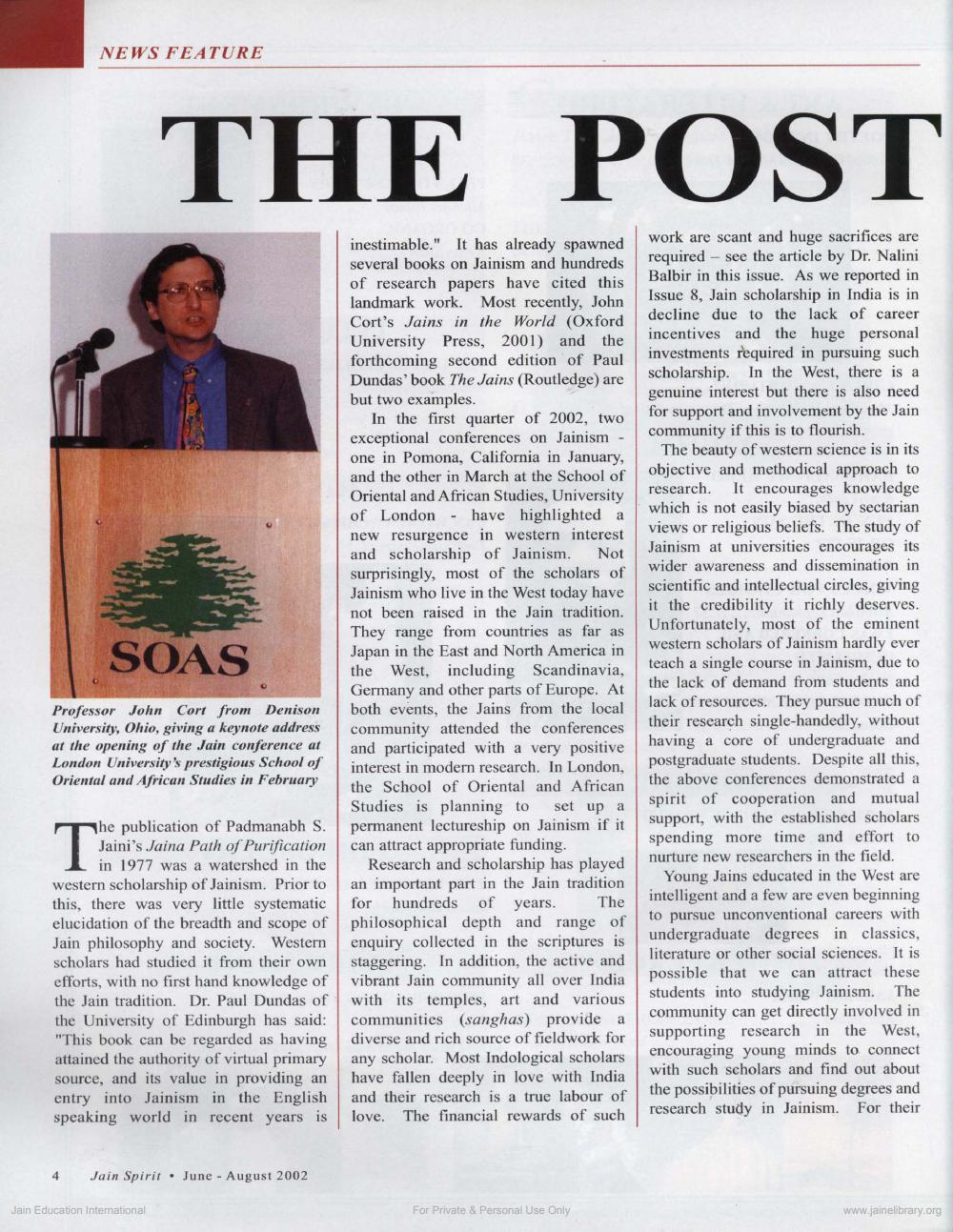Book Title: Jain Spirit 2002 06 No 11 Author(s): Jain Spirit UK Publisher: UK Young Jains View full book textPage 6
________________ NEWS FEATURE THE POST SOAS inestimable." It has already spawned several books on Jainism and hundreds of research papers have cited this landmark work. Most recently, John Cort's Jains in the World (Oxford University Press, 2001) and the forthcoming second edition of Paul Dundas' book The Jains (Routledge) are but two examples. In the first quarter of 2002, two exceptional conferences on Jainism - one in Pomona, California in January, and the other in March at the School of Oriental and African Studies, University of London - have highlighted a new resurgence in western interest and scholarship of Jainism. Not surprisingly, most of the scholars of Jainism who live in the West today have not been raised in the Jain tradition. They range from countries as far as Japan in the East and North America in the West, including Scandinavia, Germany and other parts of Europe. At both events, the Jains from the local community attended the conferences and participated with a very positive interest in modern research. In London, the School of Oriental and African Studies is planning to set up a permanent lectureship on Jainism if it can attract appropriate funding. Research and scholarship has played an important part in the Jain tradition for hundreds of years. The philosophical depth and range of enquiry collected in the scriptures is staggering. In addition, the active and vibrant Jain community all over India with its temples, art and various communities (sanghas) provide a diverse and rich source of fieldwork for any scholar. Most Indological scholars have fallen deeply in love with India and their research is a true labour of love. The financial rewards of such work are scant and huge sacrifices are required - see the article by Dr. Nalini Balbir in this issue. As we reported in Issue 8, Jain scholarship in India is in decline due to the lack of career incentives and the huge personal investments required in pursuing such scholarship. In the West, there is a genuine interest but there is also need for support and involvement by the Jain community if this is to flourish. The beauty of western science is in its objective and methodical approach to research. It encourages knowledge which is not easily biased by sectarian views or religious beliefs. The study of Jainism at universities encourages its wider awareness and dissemination in scientific and intellectual circles, giving it the credibility it richly deserves. Unfortunately, most of the eminent western scholars of Jainism hardly ever teach a single course in Jainism, due to the lack of demand from students and lack of resources. They pursue much of their research single-handedly, without having a core of undergraduate and postgraduate students. Despite all this, the above conferences demonstrated a spirit of cooperation and mutual support, with the established scholars spending more time and effort to nurture new researchers in the field. Young Jains educated in the West are intelligent and a few are even beginning to pursue unconventional careers with undergraduate degrees in classics, literature or other social sciences. It is possible that we can attract these students into studying Jainism. The community can get directly involved in supporting research in the West, encouraging young minds to connect with such scholars and find out about the possibilities of pursuing degrees and research study in Jainism. For their Professor John Cort from Denison University, Ohio, giving a keynote address at the opening of the Jain conference at London University's prestigious School of Oriental and African Studies in February he publication of Padmanabh S. Jaini's Jaina Path of Purification in 1977 was a watershed in the western scholarship of Jainism. Prior to this, there was very little systematic elucidation of the breadth and scope of Jain philosophy and society. Western scholars had studied it from their own efforts, with no first hand knowledge of the Jain tradition. Dr. Paul Dundas of the University of Edinburgh has said: "This book can be regarded as having attained the authority of virtual primary source, and its value in providing an entry into Jainism in the English speaking world in recent years is 4 Jain Spirit . June - August 2002 Jain Education International For Private & Personal Use Only www.jainelibrary.orgPage Navigation
1 ... 4 5 6 7 8 9 10 11 12 13 14 15 16 17 18 19 20 21 22 23 24 25 26 27 28 29 30 31 32 33 34 35 36 37 38 39 40 41 42 43 44 45 46 47 48 49 50 51 52 53 54 55 56 57 58 59 60 61 62 ... 68
